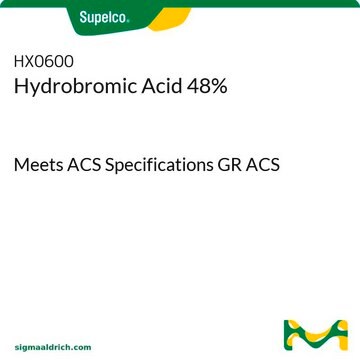248630
Hydrogen bromide solution
33 wt. % in acetic acid
Synonym(s):
HBr
About This Item
Recommended Products
vapor density
2.8 (vs air)
Quality Level
vapor pressure
11.4 mmHg ( 20 °C)
form
liquid
concentration
30-32% HBr
33 wt. % in acetic acid
density
1.354 g/mL at 25 °C
SMILES string
Br
InChI
1S/BrH/h1H
InChI key
CPELXLSAUQHCOX-UHFFFAOYSA-N
Looking for similar products? Visit Product Comparison Guide
Physical properties
Signal Word
Danger
Hazard Statements
Precautionary Statements
Hazard Classifications
Eye Dam. 1 - Met. Corr. 1 - Skin Corr. 1B - STOT SE 3
Target Organs
Respiratory system
Storage Class Code
8A - Combustible corrosive hazardous materials
WGK
WGK 1
Flash Point(F)
Not applicable
Flash Point(C)
Not applicable
Certificates of Analysis (COA)
Search for Certificates of Analysis (COA) by entering the products Lot/Batch Number. Lot and Batch Numbers can be found on a product’s label following the words ‘Lot’ or ‘Batch’.
Already Own This Product?
Find documentation for the products that you have recently purchased in the Document Library.
Customers Also Viewed
Our team of scientists has experience in all areas of research including Life Science, Material Science, Chemical Synthesis, Chromatography, Analytical and many others.
Contact Technical Service












